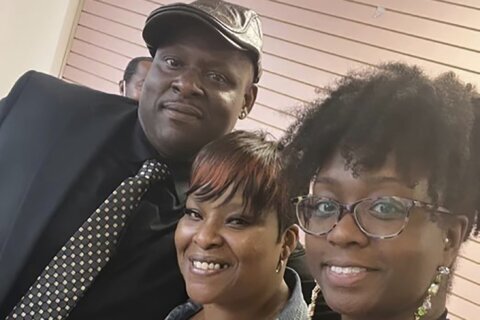Ohio Sen. JD Vance, Donald Trump’s running mate, defended on Wednesday a false claim the former president made about Vice President Kamala Harris ‘ racial identity, suggesting wrongly that Harris had downplayed her Black heritage in trying to suggest she’s inauthentic.
“What I took it as was an attack on Kamala Harris being a chameleon,” he told reporters when asked in Michigan about the former president’s suggestion that Harris, the daughter of Jamaican and Indian immigrants, had only recently identified as Black.
“I think he was observing the basic foundational reality that Kamala Harris pretends to be something different depending on what audience she’s speaking to,” Vance said. “She fakes who she is depending on the audience she’s in front of, and that’s who she is and that’s who she’s always been.”
Vance’s was the most recent of the Republican criticisms of how Harris portrays herself, in the wake of Trump’s comments last week to the National Association of Black Journalists conference in Chicago. Florida Rep. Byron Donalds, a high-profile Trump surrogate who is a Black man, echoed the claim on Sunday as a guest on ABC’s “This Week.”
The proliferation of Trump’s falsehood by other Republicans is part of their effort to stay in his favor, said former Republican National Committee Chairman Michael Steele.
“It’s ‘I’ll do anything and I don’t want to be on the wrong side of you,'” said Steele, a former Maryland lieutenant governor who was the first Black man to lead the RNC. “It’s ‘I don’t want to take the heat that comes with calling out your racism, that comes with calling out your ugliness, so I will pretend that’s not what it is’.”
The Harris campaign has declined to comment specifically on Trump’s false claim. The vice president, speaking to a Black sorority last week, accused Trump of “the same old show: the divisiveness and the disrespect.”
Harris has frequently talked about being Black in addition to being Indian American during her political career. She was the first African American to serve as California attorney general and became the first Indian American to serve as a U.S. senator and the second Black woman, after Carol Moseley Braun of Illinois.
As an undergraduate, Harris attended Howard University, one of the nation’s most prominent historically Black colleges and universities, where she also pledged the historically Black sorority Alpha Kappa Alpha.
As San Francisco’s first Black district attorney, she was recognized as a “Woman of Power” by the National Urban League and received the Thurgood Marshall Award from the National Black Prosecutors Association in 2005.
She was recognized in India Abroad during her 2010 campaign for California attorney general as being potentially “the first African American as well as the first Indian-American” to hold the office.
Harris identified as both Black and Indian in an Associated Press story published that same year about the number of candidates of Indian descent running for prominent offices that year.
“I grew up in a family where I had a strong sense of my culture and who I am, and I never felt insecure about that at all,” she said at the time. “Slowly, perhaps, with each of us taking on more prominent positions, people will start to understand the diversity of the people.”
Harris joined the Congressional Black Caucus when she entered the Senate in 2017. And writing about her time at Howard in her 2019 memoir, “The Truths We Hold,” Harris wrote: “Every signal told students that we could be anything — that we were young, gifted, and black, and we shouldn’t let anything get in the way of our success. The campus was a place where you didn’t have to be confined to the box of another person’s choosing.”
The echo of Trump’s claim comes as the Republican nominee has tried to cut into Harris’ fundraising and media attention following her taking over President Joe Biden’s campaign after the president quit the race. Some Republican strategists have criticized Trump for making personal attacks that echo his past questioning of President Barack Obama’s citizenship, instead of pivoting to issues like the economy or immigration.
Vance previously hit Harris for using what he called a “fake Southern accent” when she campaigned in Atlanta last week. And Michaelah Montgomery, a Black conservative activist who organized a widely shared Trump meet-and-greet with local college students at an Atlanta Chick-fil-A, tore into Harris at the former president’s rally on Saturday, suggesting of Harris, “She’s only Black when it’s time to get elected.”
Rashawn Ray, a national scholar on racial and social inequity and vice president at American Institutes for Research, said the criticism willfully ignores the growing number of people who identify as multiracial.
“People can be both Black and Asian,” Ray said.
Casting doubt on Harris’ identification as Black is also an effort to use race to undermine her qualification to be president — as Trump did questioning Obama’s citizenship — said Ray.
“Some people believe that by attacking the authenticity of Vice President Harris’ Blackness, they can send a dog whistle that questions her Americanness and electability,” Ray said. “People are often judged by what they look like rather than what they represent. Some people are banking on the shallowness of this perspective.”
___
Beaumont reported from Des Moines, Iowa. Associated Press researcher Rhonda Shafner in New York contributed to this report.
Copyright © 2024 The Associated Press. All rights reserved. This material may not be published, broadcast, written or redistributed.







